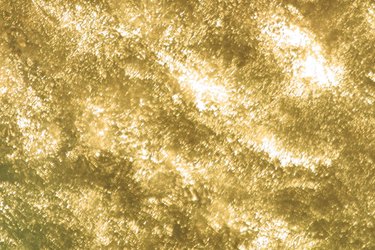Things You'll Need
Tongs to handle the crucible
Graphite crucible
Flux
Fire
Mold for the molten gold
Glass retort
Diluted nitric acid

There are two main sources for gold: mining and scrap. As gold prices go up, gold recycling becomes more attractive. But different pieces of recycled gold vary in the amount of gold they actually contain. Gold can be mixed with other metals like copper, which is used in red gold, or mercury, which is used in dental gold. Gold is a very pliable metal and its melting point is relatively low; therefore, refining it by melting it and extracting the other metals from it is a practical process.
Step 1
Insert the gold scraps and the flux into the crucible.
Video of the Day
Step 2
Put the crucible into the fire.
Step 3
Stoke the fire until the heat reaches 1947.52 degrees Fahrenheit, which is the melting point of gold. The gold in the crucible will start to melt.
Step 4
Remove the crucible from the fire when all of the gold is molten.
Step 5
Pour the molten gold into the mold and let it cool.
Step 6
Separate the base metals (copper, silver, iron, tin, lead, mercury, antimony) from the gold. They will float to the top of the mold.
Step 7
Insert the gold into a retort with diluted nitric acid.
Step 8
Pour off the nitric acid; pure gold remains.
Tip
Professional refiners use an electrical process to separate the gold from other metals.
Flux consists of a mixture of borax and sodium carbonate, and helps the gold melt evenly.
Warning
The flux can corrode containers made from materials other than graphite. This may allow the gold to leach out, which can be very dangerous since molten gold is very hot.
Nitric acid fumes can be lethal. Exercise caution.
Video of the Day